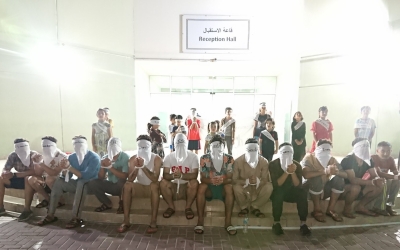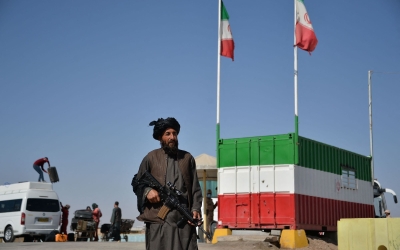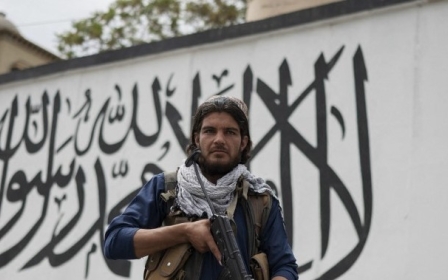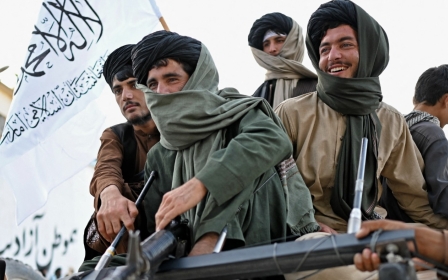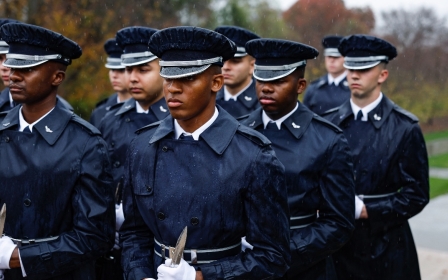Taliban appoint new UAE consul general in latest diplomatic push
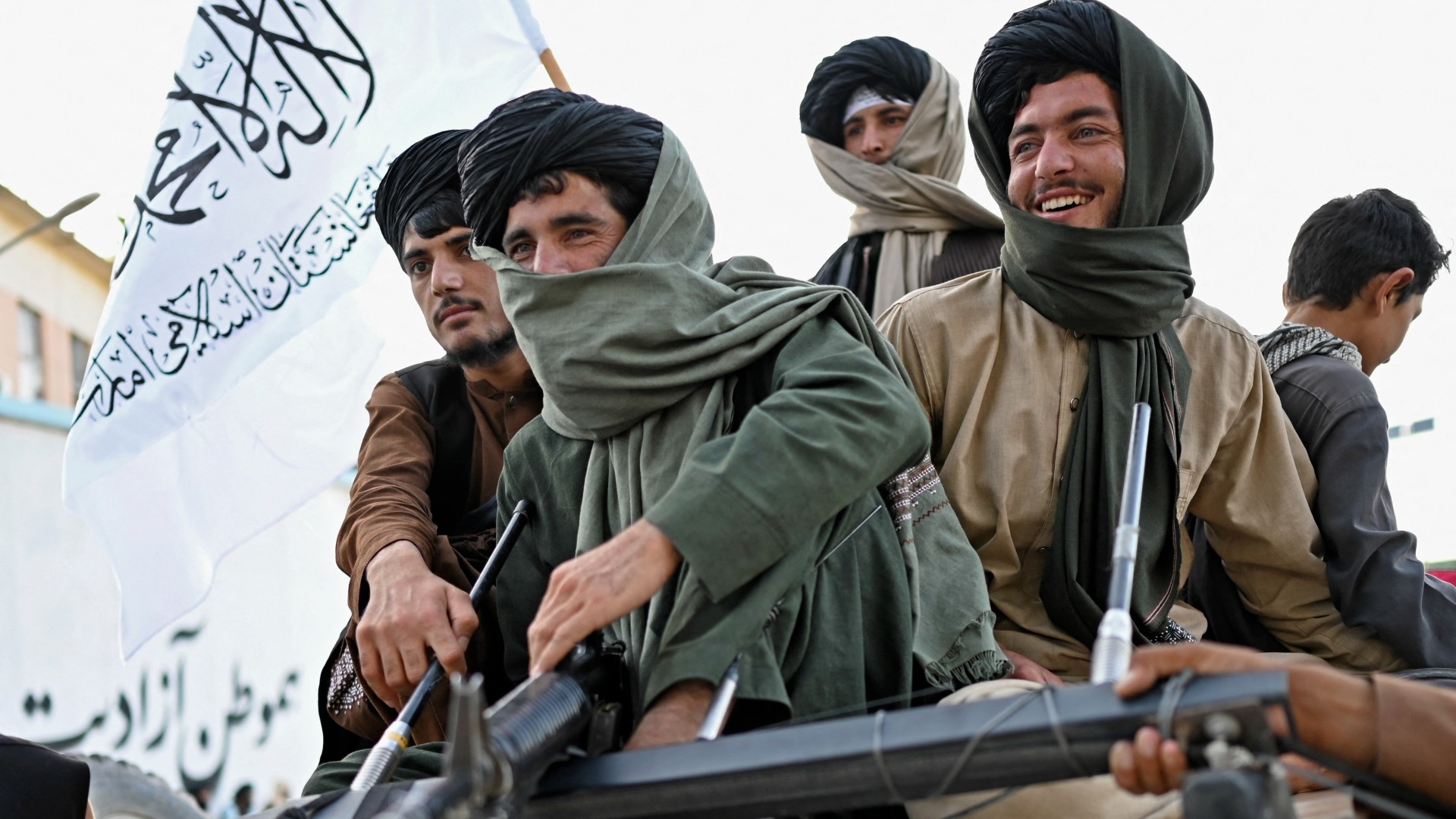
Afghanistan's Taliban government appointed a new consul general to the United Arab Emirates on Tuesday, in another step aimed at formalising ties with the Gulf country.
The Islamic Emirate's Ministry of Foreign Affairs said in a letter that Abdur Rahman Feda, the ministry's chief of protocol, would serve as the new consul general in Dubai.
Feda replaced Masood Ahmad Azizi, who had been appointed by the former western-backed government in 2020 and had remained in his post until this week.
'These countries need a representative to work out issues with the current government'
- Asif Moblegh, Afghan political analyst
Feda's arrival in Dubai on Wednesday marks the latest in a series of diplomatic moves aimed at shoring up support for the Islamic Emirate in the region.
Earlier this month, the Taliban government sent their chosen diplomats to the country's embassy in Iran and the consulate in Turkey, respectively.
New MEE newsletter: Jerusalem Dispatch
Sign up to get the latest insights and analysis on Israel-Palestine, alongside Turkey Unpacked and other MEE newsletters
The Taliban government has yet to be formally recognised by any nation, and the international community is grappling with how to deal with the country's new rulers while also helping Afghans face an economic and humanitarian crisis.
A former Afghan diplomat currently based in the Gulf told Middle East Eye that the diplomatic shifts were a matter of "regional necessity" given economic realities in the Middle East and Asia.
Asking not to be identified due to the sensitivity of the issue, the former diplomat said the ongoing humanitarian crisis and the continued flow of refugees outside Afghanistan meant regional countries had to create official channels with the Islamic Emirate.
Lack of official status
Since the autumn of 2021, the Islamic Emirate has appointed diplomats to various positions in embassies and consulates across the Muslim and Arab-speaking world, including Pakistan, Russia, China, Qatar, Saudi Arabia and Malaysia.
Asif Moblegh, an Afghan political analyst based in Turkey, downplayed the move, and said while the Islamic Emirate had managed to attain "de-facto recognition" it still lacked official state status.
"It's merely a communication channel… These countries need a representative to work out issues with the current government, and in this case, it's the Taliban," Moblegh said of why countries like the UAE, Iran and Turkey were willing to accept the Islamic Emirate's diplomats.
On the same day as Feda's appointment, a delegation from the Islamic Emirate's Ministry of Refugees and Repatriation travelled to Iran where they will reportedly assess the situation of Afghan refugees.
UAE outreach
The UAE cut ties with the Taliban following the 9/11 attacks, but the two sides have cultivated strong relations since the US withdrew its forces in 2021.
In December, an Islamic Emirate delegation led by Acting Defence Minister Mawlawi Mohammad Yaqoob Mujahid, the son of Taliban founder Mullah Mohammad Omar, flew to Abu Dhabi to meet with UAE President Mohammed Bin Zayed.
Shortly after his meeting with the Taliban, MBZ, as the UAE president is colloquially known, travelled to Doha, where he met with Qatar's Emir Tamim bin Hamad Al Thani during the World Cup.
Diplomatic, humanitarian and academic sources familiar with the matter told MEE at the time that although international media largely tied the meeting to the sporting event, discussions were actually largely focused on Afghanistan.
Since the Taliban returned to power in the summer of 2021, both countries have become inextricably tied to Afghanistan.
When former President Ashraf Ghani fled the country, accompanied by a cadre of other officials, they eventually ended up in Abu Dhabi. Though most of the others aboard the plane eventually returned to their families in Europe and the United States, Ghani remained in the Emirati capital.
For its part, Doha has played host to Taliban delegations since 2011, when former US President Barack Obama had hoped to use Qatar as a base from which US and Afghan officials could negotiate with the group who were staging a bloody resistance to the former government and its western backers.
Doha was also where the Trump administration signed the February 2020 peace agreement that would eventually lead Joe Biden to withdraw all US forces on 31 August 2021.
By November 2021, the Biden administration had named Qatar as Washington’s diplomatic representative to the Taliban’s Islamic Emirate.
Sources speaking to the MEE on condition of anonymity said since late 2022 there have been growing disagreements between the US, the Europeans and the Islamic Emirate, who have different views of who should serve as the primary intermediary between the West and the Taliban-run government.
Diplomatic and academic sources familiar with the matter say many in the Islamic Emirate prefer to work with Abu Dhabi, whereas the West continues to place its hopes in Doha.
Seeking investment
The Taliban is also focused on reaching out to the diaspora in the UAE, where an estimated 300,000 live, including high-profile traders and investors.
Last month, the head of the Afghan Business Council, Haji Obaidullah Sader Khail, told local media that Afghans had invested more than $10bn in the UAE and were willing to bring their money to Afghanistan if the Islamic Emirate creates a suitable environment.
Additionally, many Afghans who either live in or have families in Iran and Pakistan have also turned to the Dubai consulate for assistance, due to overcrowding at the missions in Tehran and Islamabad.
Recognising all of this, officials from the Islamic Emirate have made repeated visits to the UAE, trying to woo potential Emirati and Afghan investors to the country, which is currently facing a severe economic downturn due to Western sanctions, aid cutbacks and banking restrictions.
Last spring, Kabul signed a memorandum of understanding with the UAE-based consortium GAAC/G42 to take over responsibility for ground services at the international airports in Kabul, Herat and Kandahar.
At the time, the hope was the agreement would lead to the return of international airlines to Afghanistan, in particular, the UAE’s budget carrier FlyDubai.
However, after several announcements of an impending resumption, Emirati and Turkish airlines have yet to return to Afghanistan.
Even without the return of international flights, the agreement was seen as a decisive move by the Islamic Emirate vis-a-vis its relations in the Persian Gulf.
For nearly a year, Abu Dhabi's former rivals in Doha, along with Turkey, were in talks to help run Afghanistan's airports.
Still, Wali Forotan, a political analyst based in Kabul, said these countries had largely woken up to the harsh reality of the country, which is currently being run by a government accused of human rights abuses, and denying women's access to education and work.
Forotan said that even if they don't particularly care for the Islamic Emirate's policies, they see it as "a strong fighting force that has some support among the people" and as such, they are hoping that the Taliban can serve as "one group who can possibly work together to also help them achieve their goals" in Afghanistan and the region.
Middle East Eye delivers independent and unrivalled coverage and analysis of the Middle East, North Africa and beyond. To learn more about republishing this content and the associated fees, please fill out this form. More about MEE can be found here.


